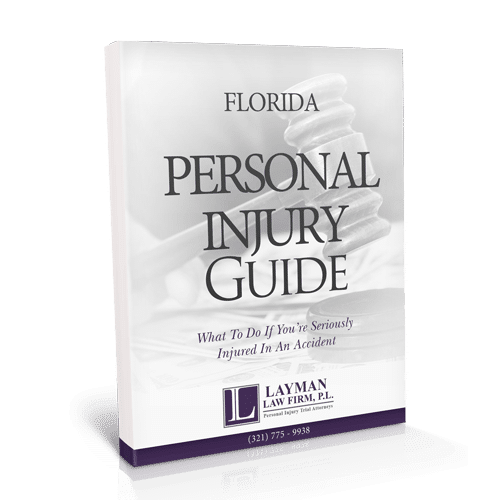Melbourne Catastrophic Injury Lawyers
A catastrophic injury is typically a life-changing injury that can leave a victim with physical pain or scars, lasting emotional trauma, and long-term financial hardship. Managing your life after suffering a catastrophic injury can be difficult; however, it can be even harder when the negligence of another party caused or contributed to the accident that led to your injuries.
As the victim of a catastrophic injury, you will likely need to locate medical providers and schedule treatment as well as communicate with insurance companies and potentially navigate the legal system. Trying to handle all this alone while simultaneously dealing with the physical pain and psychological trauma caused by the accident can be overwhelming. Fortunately, there is no need to go it alone because help is available. The experienced Melbourne catastrophic injury lawyers at Layman Law Firm, P.L. have extensive experience helping victims recover the compensation to which they are entitled to for catastrophic injuries caused in whole or in part by another party (or parties).
What Is a Catastrophic Injury?
The American Medical Association (AMA) defines a “catastrophic injury” as a severe injury to the spinal cord, spine, or brain; however, the term is used by the public in a broader context to describe a wide range of serious injuries. While there is no universally accepted definition of a catastrophic injury, the legal community tends to use the term to refer to an injury that is life-altering and that is permanent or long-lasting. Common examples of injuries that might be classified as a “catastrophic injury” include:
- Traumatic brain injury (TBI). A TBI can cause swelling of the brain which can lead to death or life-long cognitive impairment as well as speech and mobility problems.
- Spinal cord injuries. Along with complete or partial paralysis, a spinal cord injury can cause neurological damage, respiratory and circulatory problems, bowel and bladder control issues, and chronic pain.
- Organ damage. Organ damage can lead to internal bleeding, organ failure, or the need for lifelong treatment and medication.
- Severe burns. Serious burn injuries can leave lasting scars as well as cause a loss of mobility, increased susceptibility to infections, and chronic pain.
- Amputations. When a limb or other body part must be amputated it not only causes psychological trauma, but it can also cause problems with daily tasks of living such as walking, dressing, eating, and working.
Causes of Catastrophic Injuries
Although people typically think of a car accident when they envision a catastrophic injury, there are an infinite number of other ways that a victim can sustain a catastrophic injury, including:
- Large truck accidents
- Workplace accidents
- Boating accidents
- Sport injuries
- Pedestrian accidents
- Bicycle accidents
- Medical errors, including surgical and medication errors
- Defective products
- Premises liability accidents
- Construction accidents
- Swimming pool accidents
- Birth injuries
- Falls
- Intentional assaults
Catastrophic Injury Damages
By their very nature, a catastrophic injury results in significant economic and non-economic damages. Economic damages represent the out-of-pocket expenses associated with the injury, such as hospital and doctor bills, the cost of rehabilitation, and lifelong medical care associated with the injury. Non-economic damages cover the emotional trauma suffered by the victim and include things such as loss of future earning capacity, physical and emotional pain and suffering, and a diminished quality of life. In addition, if you lost a family member because of a catastrophic injury, you may be entitled to compensation as the claimant in a wrongful death lawsuit.
To put the cost of a catastrophic injury in perspective consider that, according to the Centers for Disease Control and Prevention (CDC), the five-year outcome for a TBI victim is as follows: 22% died, 30% became worse, 22% stayed the same, and 26% improved. Even a mild to moderate TBI will cost an estimated $25,174 to $81,153 to treat, according to the National Institutes of Health while a severe TBI will cost between $600,000 and $1,875,000 over a lifetime. Moreover, the average first-year costs alone of treating a spinal cord injury range from about $350,000 to over $1 million, according to the Christopher and Dana Reeve Foundation.
Who Is Liable for Damages in a Catastrophic Injury?
The lifetime expenses related to a catastrophic injury can be staggering. When another party’s negligence caused or contributed to the injury, that party may be held legally liable for compensating the victim. Like most states, Florida uses comparative negligence, meaning that if another party’s negligence was even partially responsible for the accident that led to your injuries, that party may be proportionately liable for damages. For example, if you suffered a spinal cord injury in a car accident, and the other driver is determined to be 70 percent at fault, that driver would be responsible for 70 percent of the damages associated with your injury.
Steps to Take Following a Catastrophic Injury
A catastrophic injury can occur at any time and under any circumstances. While it is impossible to truly be prepared for such an injury, there are some steps you should always take if you or a loved one suffer what could be a catastrophic injury, including:
- Seek medical treatment immediately. With many catastrophic injuries, a delay in treatment can mean the difference between maximum recovery and additional complications or even death. A TBI, spinal cord injury, or organ damage may not show immediate outward signs of the severity of the injury which illustrates why an immediate medical examination is crucial. Always accept immediate transport to the nearest emergency room for an evaluation.
- Preserve evidence. If/when you are able, ask a family member or loved one to document the accident by taking cell phone photos of the accident itself and the surrounding area. Also, ask someone to gather contact information from anyone involved and from witnesses. Start a file for hospital reports and bills as well as all other expenses related to your injury.
- Consult with an experienced catastrophic injury attorney as soon as possible. If the responsible party had liability insurance coverage, you will likely be contacted by an adjuster soon after the accident. They may even offer you what sounds like a significant amount of money to settle your claim against their insured. Because of the life-long impact a catastrophic injury has on the victim, determining the true value of a claim for damages often takes months, even years. For this reason alone, never speak to an insurance adjuster without first consulting with an experienced attorney to ensure that you are fully compensated for all your injuries.
Contact the Experienced Melbourne Catastrophic Injury Lawyers at Layman Law Firm, P.L.
If you suffered a catastrophic injury, or you lost a family member because of a catastrophic injury, contact the experienced Melbourne catastrophic injury lawyers at Layman Law Firm, P.L. to discuss your legal options. We are committed to ensuring that victims of catastrophic injuries are fully and fairly compensated by the responsible party or parties. Contact the team today for your free initial consultation by calling 321-773-2111 or by filling out our convenient Intake Evaluation Form online.






